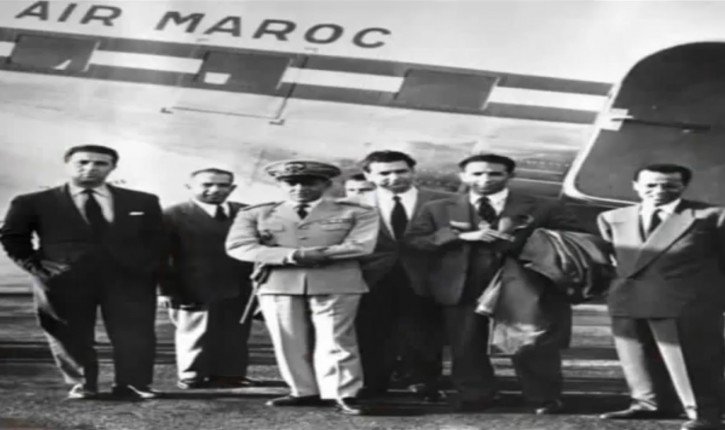On October 22, 1956, France committed the first act of piracy in the history of civil aviation by intercepting the aircraft of the five leaders of the FLN.
The leaders of the National Liberation Front, Ahmed Ben Bella, Mohamed Khider, Mohamed Boudiaf, Hocine Ait Ahmed and the journalist and intellectual, Mustafa Lacheraf, are received by the King of Morocco, Mohammed V, in Rabat, on October 20, 1956. Their discussion is mainly focused on the Tunis conference in which they are all due to attend two days later. This conference should welcome the heads of the FLN and the Tunisian and Moroccan presidents around the same table, with the objective of “modifying the political equation in North Africa”, so that the Algerian question becomes a Maghreb affair.
On October 22, the historic leaders and Mustafa Lacheraf prepare to take the same plane as the King of Morocco, but at the last minute a change occurs. The king will take a special plane that will fly over Algeria, while the leaders of the FLN board a DC3 of the Air Atlas company, with journalists and a seriously ill who must be hospitalized in Tunis on board. The aircraft must fly over the Mediterranean (avoiding Algerian airspace) to take no risk.
Much more will flow from this last-minute change, going so far as to lay charges against the Moroccan side. However, Aït Ahmed, affirms in a program of Medi1-Sat (2008), that it is himself who asked for this change fearing to make “take risks” to the king by making him travel in the same apparatus as the leaders. of the FLN who were wanted by the French services. Ben Bella, meanwhile, claims the change is due to the King traveling with his wife.
The DC3 therefore took off with delay and landed in the Balearics, while the stopover was not on the flight schedule. Some believe that this is when negotiations take place between the members of the crew and the French secret services. Be that as it may, the decision to intercept the aircraft is taken with the approval of the Secretary of State for War in charge of monitoring military operations in Algeria, Max Le Jeune, the director of the cabinet of the Minister of Defense, Abel Thomas, and the resident minister-governor of Algeria, Robert Lacoste.
At 4 p.m., the French army contacted the crew, who were entirely French, and ordered them to land the aircraft in Algiers. The plane turns in circles until nightfall to arrive in Algiers on time for Tunis, with the help of the flight attendant. And when Ben Bella asks if this is Tunis, seeing the lights of a big city, the hostess replies in the affirmative.
The crew locked themselves in the cockpit when the descent began. And rush through an emergency exit when the aircraft lands on the tarmac at Algiers airport.
The passengers, plunged into darkness, are surprised by the sound of soldiers armed to the teeth which rush into the cabin. Ahmed Ben Bella, Hocine Ait Ahmed, Mohamed Boudiaf, Mohamed Khider and Mostafa Lacheref are surrounded, then handcuffed and taken to the airport lounge which is teeming with soldiers and French security agents.
The five leaders were subsequently loaded into a military vehicle and escorted to Bouzaréah, to the headquarters of the Directorate of Territorial Surveillance (DST) to undergo questioning.
They will be transferred to France and detained in different places: La Santé prison, Aix Island, Turquant castle and finally, Aulnoy, where they were held until the country gained independence in 1962.
Faced with their tormentors, the FLN leaders will say: “It is not the arrest of a few leaders or officials that will put an end to a large-scale movement originating from the depths of the people”. Indeed, the revolution will continue with more firmness.
For its part, France, by hijacking this plane, will commit the first act of civil aviation piracy which will be disowned by a large part of the French left and by international opinion.
Z.M.
Sources:
“Hijacking of the FLN plane”, fiftieth anniversary magazine: Ministry of Foreign Affairs – APS Fiftieth anniversary of Algerian diplomacy 1962-2012.
www.memoria.dz





